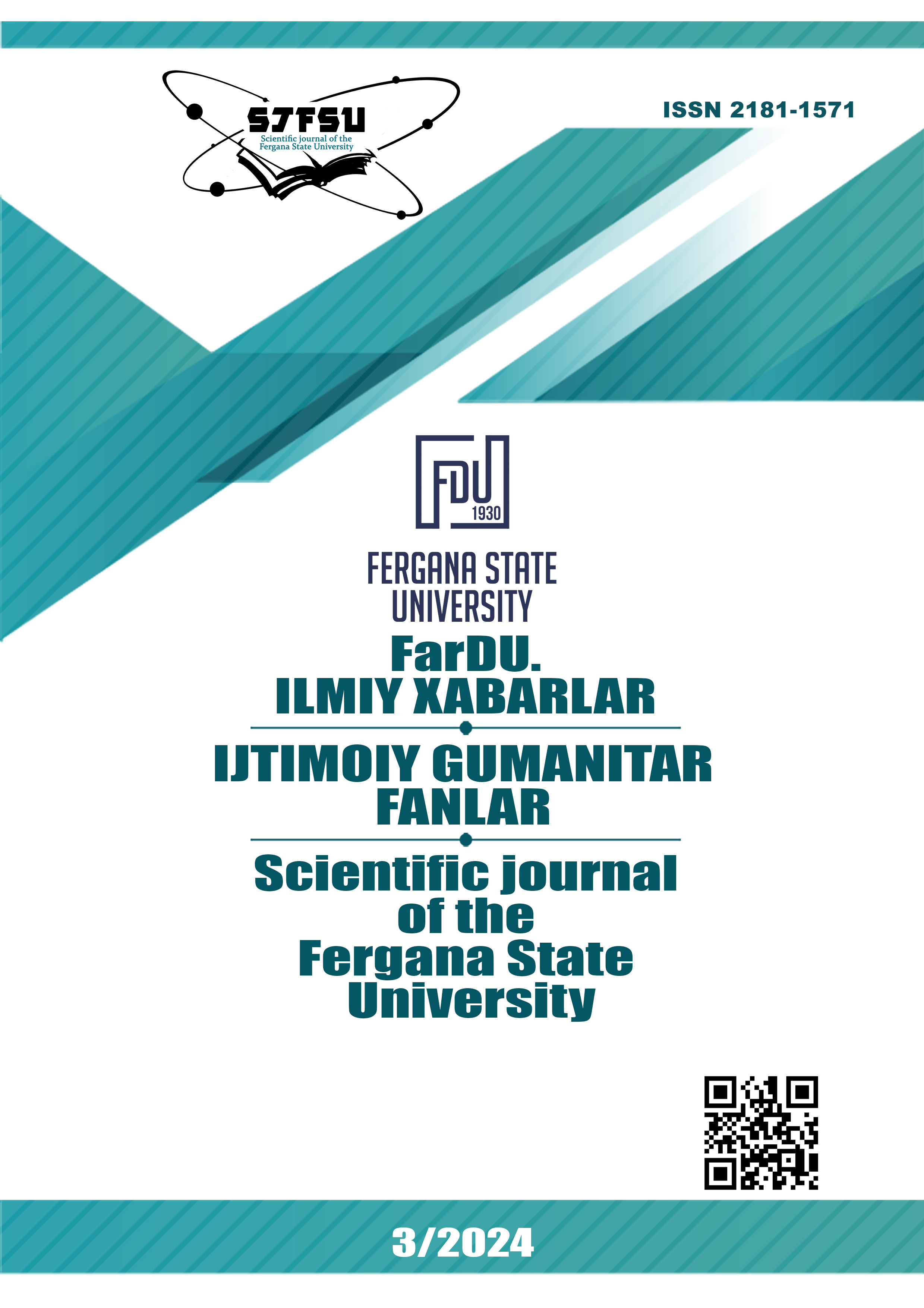THE ROLE OF USING STEAM TECHNOLOGY IN TEACHING ENGLISH IN PRIMARY EDUCATION
Keywords:
zamonaviy tendensiyalar, axborot-kommunikasiya texnologiyalar, integrasiya, ta’lim texnologiyalari, interpritasiya, modifikasiya.Abstract
This article discusses the role of using STEAM technology in the process of teaching English in primary school, its advantages, as well as the history of STEAM, its essence and content. The modern educational paradigm should serve to develop the skills and competencies of harmonizing cognitive and moral qualities from the lowest level of education, studying man and nature as an integral interconnected system, accustoming to a conscious analysis of the relationships in it, and mutual implementation of natural scientific knowledge and social knowledge. On the other hand, in primary education there is a need to teach students to independently acquire the necessary knowledge, engage in creative activities, generate personal motivation for learning and apply the acquired theoretical knowledge in real life situation. Achieving the formation of knowledge in the personality of each student, starting from primary school, creates the basis for the development of basis and subject competencies at subsequent stages of education.
References
Popova T. G. ta'lim robototexnika: tegishli materiallar dayjesti. 2015.70 betlar.
Franskevich A. A. oʻrta maktablarda STEM ta'limi tamoyillarini qoʻllash tajribasidan / / toʻplamda: zamonaviy oʻquv jarayonida axborot tizimlari va kommunikasiya texnologiyalari. II xalqaro amaliy konferensiya. 2014. 108-111 betlar.
Frolov A. V. Aqshning "yangi iqtisodiyotida" STEM ta'limining roli / / yangi iqtisodiyot masalalari. 2010. No. 4 (16). 80-90 betlar.
Oʻzbekiston Respublikasi Prezidentining Oʻzbekiston Respublikasi xalq ta'limi tizimini 2030 yilgacha rivojlantirish konsepsiyasini tasdiqlash toʻgʻrisidagi farmoni 29.04.2019 yildagi PF-5712-son
Breiner J., Harkness S., Johnson C., Koehler C. What Is STEM? A Discussion About Conceptions of STEM in Education and Partnerships // School Science and Mathematics. 2012. doi: 10.1111/j.1949-8594.2011.00109.x
G.Yakman. STEAM – An Educational Framework to Relate Things To Each Other And Reality. K12 Digest February 02.2020.
STEAM - Rossiya va dunyoda ta'limi. Kim bilan boʻlish kerak? Nima qilish kerak? // Ta'lim sifati. 2014. No. 11. 52-55 betlar.
Downloads
Published
Issue
Section
License
Copyright (c) 2024 Scientific journal of the Fergana State University

This work is licensed under a Creative Commons Attribution-NonCommercial-NoDerivatives 4.0 International License.
How to Cite
Most read articles by the same author(s)
- , , TARGETED PEDAGOGICAL SYSTEM OF DEVELOPING TOLERANCE SKILLS IN PRIMARY CLASS STUDENTS DURING THE EDUCATIONAL PROCESS , Scientific journal of the Fergana State University: No. 6 (2023): FarDU ilmiy xabarlari jurnali (Ijtimoy gumanitar fanlar)
- , , GENDER EQUALITY ISSUES IN INCREASING THE SOCIAL ACTIVITY OF WOMEN IN NEW UZBEKISTAN , Scientific journal of the Fergana State University: No. 2 (2023): Scientific journal of the Fergana State University (Social humanities sciences)
- Gafurova Nodira Ravshanovna, Xomidova O‘lmasxon Ikromjon qizi, LINGUISTIC AND CULTURAL ANALYSIS OF LEXEMES EXPRESSING TRADITION IN ENGLISH AND UZBEK LANGUAGES , Scientific journal of the Fergana State University: No. 3 (2024): Scientific journal of the Fergana State University. Application set (Social humanities sciences)
- , THE EXPRESSION AND SPECIFICITY OF NEOLOGISMS IN TRANSLATION , Scientific journal of the Fergana State University: No. 1 (2024): Scientific journal of the Fergana State University (Social humanities sciences)
- , SPECIFIC CHARACTERISTICS OF WORDS AND NEOLOGISMS IN UZBEKI AND ENGLISH LANGUAGES , Scientific journal of the Fergana State University: No. 1 (2024): Scientific journal of the Fergana State University (Social humanities sciences)
- Rasulova Dilnoza Shavkatovna, Gafurova Nodira Ravshanovna, GENDER STUDY OF FORMS OF REFERENCES IN ENGLISH LANGUAGES , Scientific journal of the Fergana State University: No. 3 (2024): Scientific journal of the Fergana State University. Application set (Social humanities sciences)
- , , BIOLOGY OF IMPORTANT SPECIES FROM THE THOMISIDAE FAMILY OF THOMISIDAE IN THE FERGANA VALLEY , Scientific journal of the Fergana State University: No. 3 (2024): FarDU.Ilmiy xabarlar jurnali. Ilova to'plam (Aniq va tabiiy fanlar)
- , INTERPRETATION OF LITERARY TEXT AND HISTORICAL DEVELOPMENT OF LITERARY TEXT ANALYSIS , Scientific journal of the Fergana State University: No. 1 (2025): FarDU ilmiy xabarlari jurnali (FILOLOGIYA)
- Gafurova Nodira Ravshanovna, THE IMPACT OF ONLINE LEARNING PLATFORMS ON SCHOOL EDUCATION , Scientific journal of the Fergana State University: No. 1 (2025): FarDU ilmiy xabarlari jurnali (PEDAGOGIKA)
- Gafurova Nodira Ravshanovna, ADVANCED MNEMONIC TECHNIQUES FOR STUDENTS IN LANGUAGE COURSES , Scientific journal of the Fergana State University: No. 1 (2025): FarDU ilmiy xabarlari jurnali (PEDAGOGIKA)

